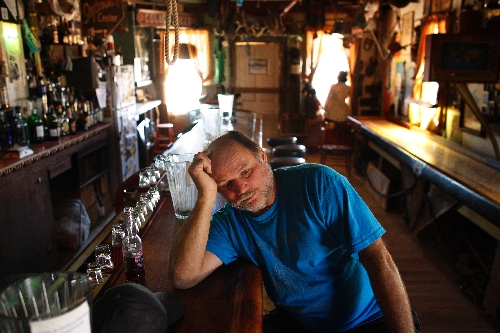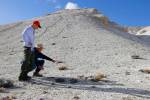Mining town residents endure years-long fight to settle dispute
Driven by "gold fever" and a love of the Old West, Herb Robbins bought land in Gold Point in 1979 and moved to the deserted mining town two years later.
Imagine his surprise when the federal government labeled him a trespasser on public land.
Robbins is one of a handful of Central Nevada residents caught up in a decades-old property dispute growing from public records that went missing or never were filed more than a century ago.
At issue are dozens of old parcels that have been bought, sold, taxed and lived on over the years in the near-ghost towns of Gold Point and Ione.
According to the Bureau of Land Management, the two townsites were never properly recorded with the federal government when they were created, so the property was never transferred into private hands. Those who now claim ownership in the two remote towns cannot get clear title.
"All they own are the real improvements on top of the surface. The rest is considered in trespass of public land," said Tom Seley, who leads the BLM's Tonopah field office.
But Robbins thinks the government has it wrong.
"I've been here over half my life now," the 58-year-old said. "I'm not a squatter."
Legislation is now pending in Congress that could clear up the issue once and for all.
Under the Nevada Mining Townsite Conveyance Act -- sponsored in the Senate by Sens. Harry Reid and John Ensign and in the House by Rep. Dean Heller -- the land would be transferred to county control so it can be deeded to its owners.
So far, though, neither bill has made it out of subcommittee.
It's a familiar refrain to those close to the issue. Measures introduced in 2003, 2004 and 2005 all quietly died without ever coming to a vote on Capitol Hill.
No one knows more about the land dispute than Sandy Johnson, who has shared a house with Robbins in Gold Point since 1992.
Johnson spent several months researching the issue as part of her job as administrative assistant for the Esmeralda County Commission.
Much of the work involved poring over pages of handwritten meeting minutes dating to the early 1900s.
"Let me tell you, you have no idea how hard that is," said Johnson, who traced the town's formative documents to the District Court level before the trail went cold.
There was a lot of history to comb through. The town wasn't officially founded until 1908, when its population peaked at about 1,000, but a mining camp had existed in the area since the late 1860s.
Gold Point was originally known as Hornsilver. The name was changed in 1932 in hopes of luring new investors during the Great Depression.
Over the next 25 years, the small community rose and fell with the fortunes of the mining industry, but by the early 1960s, only a handful of residents remained. The post office closed in 1968, leaving the town in the hands of the few solitary caretakers.
Johnson said a 1983 title search on property in Gold Point stirred the first questions about who really owns the townsite.
"That's what opened this whole can of worms," she said.
Esmeralda County's district attorney at the time responded to the government's claim of ownership with an unusual edict: He directed the county assessor to stop collecting property taxes from private landowners in Gold Point. For the past 27 years, people in the town have been taxed only on the value of their homes or other improvements, not the dirt under them, Johnson said.
Robbins first visited Gold Point in 1978. A few months later, he bought his first piece of the historic town: a vacant, 3,300-square-foot lot for $500.
In the years since, he and his investment partner, Walt Kremin, have bought up just over half of the roughly 55 buildings and "historical outhouses" still standing in the town, which is home to five full-time residents.
Robbins said he purchased some of his land at auction from Esmeralda County, which, ironically enough, seized it years earlier because the taxes went unpaid.
Robbins said fixing the ownership issue is not part of some scheme to open up the town for private development. No one is looking to turn the place into a Wild West theme park. Generally speaking, he said, folks in Gold Point aren't looking for any more neighbors than they already have.
Johnson said they just want the same rights and guarantees other land owners have, without the fear that the BLM might decide to kick them out some day.
"We want clear title to that land so we can do what we want and not be told otherwise," she said. "We'd love to get this settled in our lifetime. It would be a wonderful thing for the county. It would be a wonderful thing for the people."
Johnson can't imagine living anywhere else.
"I think I was born 100 years too late," she said. "Sometimes I'm the only one there -- just me and the chukar and the jackrabbits and the coyotes. I dearly love it."
So does Robbins, who commutes three hours each way to Las Vegas for his job as a union paperhanger. Gold Point may be 60 miles from the nearest grocery store, he said, but it has "all the comforts of home."
Residents have access to electricity, cell phone service, satellite television and the Internet. Since 2007, they have shared water from a source in town, so they don't have to haul it in from a spring-fed tank three miles away.
When Robbins first moved to Gold Point in 1981, there was no TV reception at all, and if he wanted to make a phone call, he had to drive 15 miles to the Cottontail Ranch brothel out on U.S. Highway 95.
Asked whether he thinks the land dispute might finally be resolved, Robbins just shrugged.
The effort this time around is the best he has seen yet, thanks to the support of people such as the BLM's Seley and Esmeralda County Commissioner Bill Kirby, Robbins said. On the other hand, "the wheels of government turn slow."
Nye County Commissioner Joni Eastley can vouch for that.
"When I came into office 9½ years ago, that was one of the first big projects I worked on," she said. "We've just been hopeful all this time that this specific legislation will stand on its own."
Eastley said the problem might seem too trivial for Congress to get involved, but it is vitally important to the handful of Nevada residents whose property rights hang in the balance.
"These are real issues for real people who just want to see them resolved," she said.
And it could provide the framework for fixing other land disputes left over from Central Nevada's early 20th-century mining boom.
"The Ione issue is one of many," fellow Nye County Commissioner Lorinda Wichman said. "If this legislation goes through, we'll probably try to use it for the old town of Round Mountain and for Manhattan."
That could mean more work for Seley, whose office manages 6.1 million acres in Nye and Esmeralda County.
He said he welcomes any solution to a problem that has lingered for almost three decades.
"I'm just the current inheritor of this situation," he said. "I would love to have it sorted out on my watch. It's the best thing for everyone involved."
Should the legislative option fail, however, the bureau is investigating the possibility of selling Gold Point to Esmeralda County for "fair market value," Seley said.
Before that can happen, though, the BLM will have to perform an environmental assessment and settle any outstanding mining claims.
"What we're trying to do is be responsive. There's a lot of complexity to the issue," he said.
By most accounts, the Ione situation is more complicated. The town founded in 1863 as the first seat of Nye County is now home to fewer than 20 people, but only a portion of the townsite is considered to be federal land, Eastley said.
"Here's an interesting fact: Part of the cemetery in Ione is in trespass. We have dead squatters up there," she said. "I guess it's going to be easy to prove continuous occupancy on that particular property."
Contact reporter Henry Brean at hbrean@reviewjournal.com or 702-383-0350.
Gold Point in Esmeralda County





























